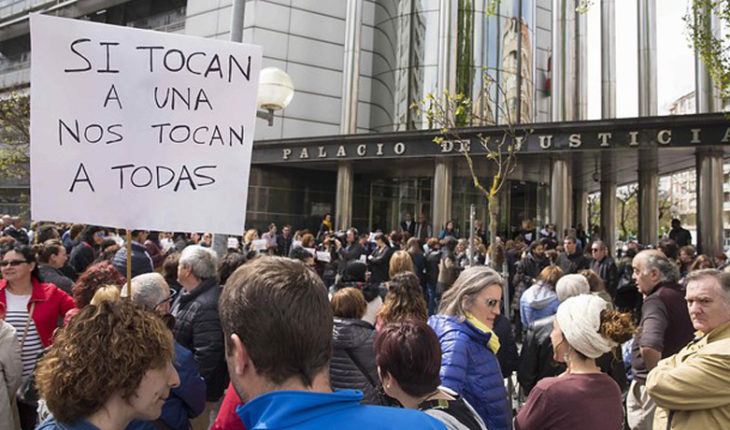The Supreme Court has ruled that the five members of ‘The Pack’ acted with “full knowledge” of what they were doing, “explicitly seeking the situation, without the victim having any knowledge” of what was going to happen and that the young woman’s silence ” can only be interpreted as a negative.”
The magistrates consider that what happened on the night of Sanfermines 2016 in Pamplona was “a multiple rape, carried out by five people, in which they all participate as perpetrators” and in which the victim was subjected to “at least ten sexual assaults”. “All this implies an intensification of the intimidation suffered by the victim with effective reduction in responsiveness, resulting in a qualitative increase in the seriousness of the situation,” explains the Sala.
This is manifested by the Criminal Chamber of the Supreme in an extensive and forceful sentence whose ruling was already released on June 21: José Angel Prenda, Antonio Manuel Guerrero, Jesús Escudero, Angel Boza and Alfonso Jesús Cabezuelo were sentenced to 15 years in prison for a continuing offence of rape, not sexual abuse, with the specific aggravators of vexatious treatment and joint action by two or more persons.
According to the judgment, it is clear from the account of the events of 7 July 2016 in Pamplona, “with complete clarity”, that the five members of ‘La Manada’ “explicitly sought the situation, without the victim having any knowledge, from the moment the same way they knew that the young woman was alone and that she couldn’t find her friends.”
The Supreme magistrates make it clear that the victim was “impressed, with fear, without responsiveness,” and experienced “a sense of anguish” and an “intense burden and unease that stupored him and made him adopt an attitude of subjugation and passivity, determining him to do what the defendants told him to do.”
SOMETER: HULATE A PERSON
In case it is not sufficiently clear, the judgment pulls the dictionary of the Royal Spanish Academy (RAE) to expose the signifificate of the verb “someter”, which in its first meaning is to “humiliate a person”, behavior in which the accused “exceeded”, imposed a “clear denigration as a woman” on the victim.
Thus, they consider that the situation described in the proven facts of the judgment entails in itself “a strong intimidating component”, such as “the sexual assault of a young girl and in a lonely, remote, narrow and no-exit place”, to which they say that she was conducted grabbed by the arm by two of the defendants and surrounded by the rest, thus being “approached by the defendants and intoxicated”.
In this sense, the magistrates insist several times throughout the sentence that after entering the portal the victim was always “directed” by the members of The Herd to the “room” where the rape took place, and once there she was so “impressed” that she did not have “capacity for reaction”. They add that the defendants found the state in which the young woman was “totally unprotected and vulnerable” “indifferent” and that they drove her to a “hidden” place.
“This certainly gave him a state of intimidation that, although not invincible, was effective in achieving the goal proposed by the defendants, who paralyzed the victim’s will to resist, without any consent on the part of the victim itself and without it being admissible to force the right to extremes of demanding from victims heroic attitudes that will inexorably lead them to suffer greater ills,” they stress.
The court formed by judges Andrés Martínez Arrieta, Andrés Palomo, Ana María Ferrer, Vicente Magro and Susana Polo (speaker of the sentence) explains that neither in the crime of sexual assault nor in the crime of sexual assault does the victim “freely” consent to sexual intercourse. But it is of the influence that the difference, pointed out by the case law of the high court, is that the “author prevails over the use of force or intimidation to bend the will of his victim”, using a “climate of fear or terror that annually his capacity to resistance.”
“While in the crime of sexual abuse consent is obtained in a vicious way or the state of incapacity to obtain it is taken advantage of, in sexual assault the will of the author is imposed by force, whether it is violent or intimidating” , apostille the sentence. In this sense, the magistrates insist that it does not take a “heroic attitude” of the victim to know that he is not giving consent.
In addition, to integrate bullying and criminalize it as a crime of rape, the Supreme has taken into account that the victim had when the events happened 18 years old and the attackers, between 24 and 27, of which his “strong physical complexion” stands out. He also points out that the young woman was alone in a city she did not know and had ingested alcoholic beverages.
JACTANCIA, OSTENTATION AND ALARDE
Alongside all this, the court does not hesitate to criticize the attitude of “boasting, ostentatiousness and boasting”, with “contempt” towards the victim, made by the defendants during the rape, a conclusion that the magistrates draw from the photographs and videos they recorded, a “situation of triumph to which the defendants wanted to give projection”.
Without quoting directly the particular vote of the judge of the Provincial Court of Navarra, who believed that ‘La Manada’ should be acquitted when considering that the events occurred in an “atmosphere of joy and rejoicing”, the Supreme is blunt: “hardly the way in that the defendants left the portal, leaving the victim naked and alone, and subtracting one of them his mobile phone, are indicative of a revelry agreed with it, which coupled with the fact that the relations maintained, in the words of the defense itself, were huge sordidness and rawness, clears any doubt about it, since in the context described in the proven facts the silence of the victim can only be interpreted as a refusal”.
In advancing the ruling on 21 June, the court found the revised “error in the legal classification of the sentence”, which “considered a single continuing crime concurrent when, for the plurality of interveners and aggressive acts the correct would have been to consider the defendants the perpetrators and participants in a plurality of sexual assault offences.”
As then, the magistrates explain in the judgment that this point “has not been challenged” by any of the accusations, so that the accusatory principle prevents the Chamber from ruling on the matter.
As for the theft of the victim’s mobile phone, for which Antonio Manuel Guerrero has been sentenced to two more years, the magistrates see “clear” that the defendant “used the intimidating field created by all the interveners to perpetrate the crime”, using “intimidation as a means of taking over” the device, so they consider the correct classification of the facts to be the crime of theft with intimidation and not theft.





